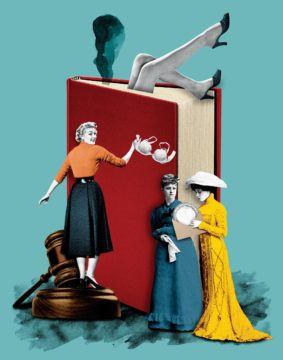Margaret Talbot in The New Yorker:
 Anthony Comstock may be the only man in American history whose lobbying efforts yielded not only the exact federal law he wanted but the privilege of enforcing it to his liking for four decades. Given that Comstock never held elected office and that the highest appointed position he occupied in government was special agent of the Post Office, this was an extraordinary achievement—and a reminder of the ways that zealots have sometimes slipped past the sentries of American democracy to create a reality that the rest of us must live in. Comstock was an anti-vice crusader who worried about many of the things that Americans of a similar moral and religious cast worried about in the late nineteenth century: the rise of the so-called sporting press, which specialized in randy gossip and user guides to local brothels; the phenomenon of young men and women set loose in big cities, living, unsupervised, in cheap rooming houses; the enervating effects of masturbation; the ravages of venereal disease; the easy availability of contraceptives, such as condoms and pessaries, and of abortifacients, dispensed by druggists or administered by midwives. But Comstock railed against all these things more passionately than most of his contemporaries did, and far more effectively.
Anthony Comstock may be the only man in American history whose lobbying efforts yielded not only the exact federal law he wanted but the privilege of enforcing it to his liking for four decades. Given that Comstock never held elected office and that the highest appointed position he occupied in government was special agent of the Post Office, this was an extraordinary achievement—and a reminder of the ways that zealots have sometimes slipped past the sentries of American democracy to create a reality that the rest of us must live in. Comstock was an anti-vice crusader who worried about many of the things that Americans of a similar moral and religious cast worried about in the late nineteenth century: the rise of the so-called sporting press, which specialized in randy gossip and user guides to local brothels; the phenomenon of young men and women set loose in big cities, living, unsupervised, in cheap rooming houses; the enervating effects of masturbation; the ravages of venereal disease; the easy availability of contraceptives, such as condoms and pessaries, and of abortifacients, dispensed by druggists or administered by midwives. But Comstock railed against all these things more passionately than most of his contemporaries did, and far more effectively.
Nassau Street, at the lower tip of Manhattan, was a particular horror to him—a groaning board of Boschian temptations. As Amy Sohn details in her fascinating book “The Man Who Hated Women: Sex, Censorship & Civil Liberties in the Gilded Age” (Farrar, Straus & Giroux), when Comstock arrived in New York as a young man, just after the Civil War, he was appalled to see an open market in sex toys and contraceptive devices (both often hawked as “rubber goods”), along with smutty playing cards, books, and stereoscopic images. At the wholesale notions establishment where he held a job, Comstock lamented that the young men he worked with were “falling like autumn leaves about me from the terrible scourges of vile books and pictures.”
More here.
